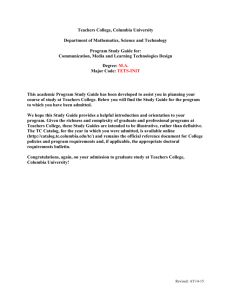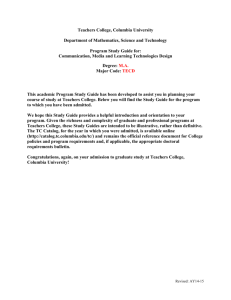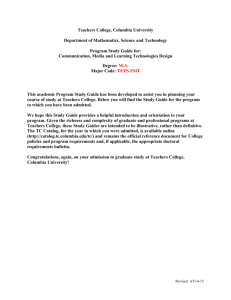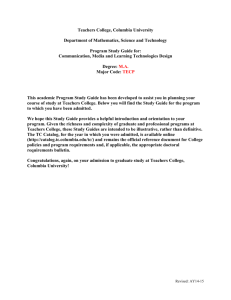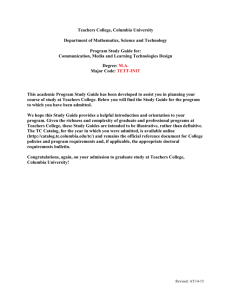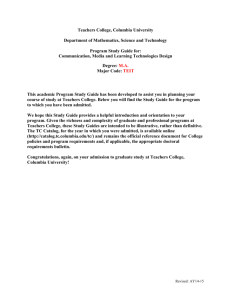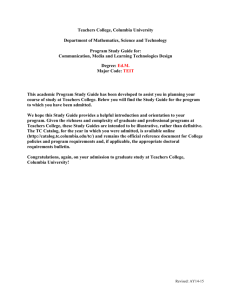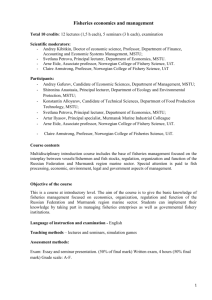Program Guide - Teachers College Columbia University
advertisement
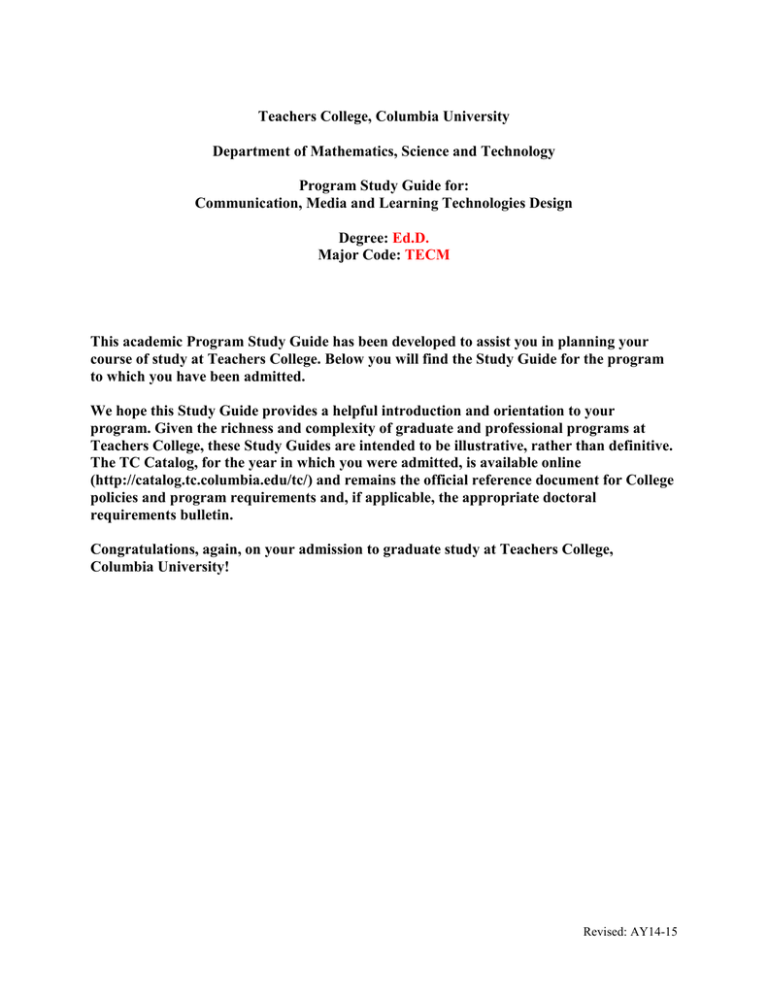
Teachers College, Columbia University Department of Mathematics, Science and Technology Program Study Guide for: Communication, Media and Learning Technologies Design Degree: Ed.D. Major Code: TECM This academic Program Study Guide has been developed to assist you in planning your course of study at Teachers College. Below you will find the Study Guide for the program to which you have been admitted. We hope this Study Guide provides a helpful introduction and orientation to your program. Given the richness and complexity of graduate and professional programs at Teachers College, these Study Guides are intended to be illustrative, rather than definitive. The TC Catalog, for the year in which you were admitted, is available online (http://catalog.tc.columbia.edu/tc/) and remains the official reference document for College policies and program requirements and, if applicable, the appropriate doctoral requirements bulletin. Congratulations, again, on your admission to graduate study at Teachers College, Columbia University! Revised: AY14-15 2 TEACHERS COLLEGE COLUMBIA UNIVERSITY Department of Mathematics, Science and Technology COMMUNICATION, MEDIA AND LEARNING TECHNOLOGIES DESIGN PROGRAM Communication and Education Degree: Doctor of Education (Ed.D.) Major Code: TECM Brief Program Description This program uses methods of the social sciences, encompassing both qualitative and quantitative approaches to the study of communication and education. It asks in particular how education and other social systems change under the impact of new media. Faculty members and students pursue three broad areas of inquiry, enabling them to: Reflect on the historical effects of media and on the cultural uses of developments such as face-to-face speech, writing, printing, photography, film, radio, television, computers, and networked multimedia; Use anthropological and linguistic methods to study how the diverse forms of communication, literacy, information processing, and cognition condition educational practice; and Explore positive and negative effects of media on social relations and develop strategies for using information and communication technologies to improve conditions of education and life. In the course of completing a degree, the student should expect to attend closely to both technical artifacts and human activity; that is, both to material systems of communication in which technologies are the primary interest and to interpersonal, direct communication dynamics in which unmediated exchanges, face-to-face, are the subject of inquiry. A major theme for continuous reflection should be the diverse ways in which the modes of communication condition the meanings actually, and potentially, communicated— particularly through the wide variety of digital means available to us. Minimum Point Requirement A minimum of 90 points of coursework are required for completion of the degree. A maximum of 45 semester hours of course credits from previous, non-Teachers College work may be transferred to count toward the 90 points required for the Ed.D. degree (see below for specifics). . Required Courses (43 points) While the program in Communication, Media and Learning Technologies Design has several required areas, there are many course choices available to students within those areas. Thus, while 43 points of requirements are listed, only 19 points are prescribed courses, and students have significant course choices within the 43 points of coursework that are taken within the required areas. Revised: AY14-15 3 MSTU 4000: Core Seminar (1 point) o Ed.D. students who begin their programs in the Fall register for MSTU 4000 (for 1 point) that Fall and register for MSTU 6600 each semester thereafter (see details below). Ed.D. students who begin their programs in the Summer register for MSTU 4000 (for 1 point) in the subsequent Fall semester and for MSTU 6600 each semester thereafter. MSTU 6600: Doctoral Colloquium (2 points required) o Ed.D. students register for MSTU 6600 beginning in their first Spring semester in the program and for each semester thereafter. o Ed.D. students must take MSTU 6600 for a total of two points after taking MSTU 4000. After two points of registration in MSTU 6600 has been achieved, students must register for MSTU 6600 for zero points continually, throughout their programs. MSTU 4016: History of Communication (3 points) MSTU 5606: Readings in Communication Theory and Social Thought I (3 points) MSTU 4031: Object-Oriented Theory and Programming I (3 points) or MSTU 5003: Theory and Programming: Interactive Media I (3 points) MSTU 7501 or MSTU 7503: Dissertation Seminar (1 point) o Students must register for the Dissertation Seminar in the semester that they present their Dissertation Proposal for approval. One course from each of the following four areas must be completed. Courses must be chosen from those listed under the respective area (12 points). Cognitive and Learning Sciences Issues and Technology MSTU 4133: Cognition and Computers MSTU 4088: Introduction to Educational Technology and Learning Sciences Social Issues and Technology MSTU 4020: Social and Communicative Aspects of ICTs MSTU 4005: Equity, Ethics and Social Issues Cultural Issues and Technology MSTU 4028: Technology and Culture MSTU 5002: Culture, Media and Education Educational Practice and Design MSTU 4001: Technology and School Change MSTU 4050: Online Schools and Online Schooling K-12 MSTU 4083: Instructional Design of Educational Technology Courses chosen relating to Research Methods and Design (12 points minimum) All Ed.D. students are required to take at least 4 research methods courses. Revised: AY14-15 4 Introductory Quantitative Methods Course, (required for all dissertations using quantitative methods) taken from the following or similar (3 points): HUDM 4122: Probability and Statistical Inference Note: HUDM 4120: Basic Concepts in Statistics does not meet this requirement. Introductory Qualitative Methods Course, taken from the following or similar (3 points): ITSF 5000: Methods of Inquiry: Ethnography and Participant Observation ITSF 5001: Ethnography and Participant Observation: Fieldwork, Analysis, Reporting C&T 5502: Introduction to Qualitative Research in Curriculum & Teaching Research/Research Design Applied to Technology (3 points chosen from the following) MSTU 5022: Conceptualizing Methods and Approaches for Research of Electronic Environments MSTU 5025: Researching Technology in Educational Environments MSTU 5001: Assessing the Impact of Technology in Schools Additional, non-introductory quantitative, qualitative, or other non-introductory research methodology class (3 points). The following are examples of what is available. Students should familiarize themselves with the full range of courses that are offered and choose a class that is relevant to their dissertation work, in consultation with their faculty advisor. A&HL 4104: Discourse Analysis A&HE 6151: Narrative Research in English Education HUDM 5122: Applied Regression Analysis HUDM 5123: Linear Models and Experimental Design ORL 6500: Qualitative Research Methods in Organizations: Data Design and Collection ORL 6501: Qualitative Research Methods in Organizations: Data Analysis and Reporting Elective Courses (38-41 points) At least 15 points of additional MSTU courses. NOTE: No more than 6 points of "skills" courses may be counted toward the Ed.D., although students are encouraged to take additional skills courses that further their interests and goals. "Skills" courses include the following (this is a sample list): MSTU 4029: Managing Educational Technology Resources MSTU 5191: Educational Video Production I MSTU 5199: Database Driven Website Development; Director; 3-D Modeling; Flash Communication Server MSTU 5814: Adobe InDesign; Digital Video; GIS in Curriculum; Creating Dynamic Websites. Students who meet the Breadth Requirement (see below) by completing the minimum 6 points required in that category have 41 points of elective coursework. Students who meet the Breadth Requirement by completing more than the minimum requirement in that category have as few as 38 points of elective coursework. Breadth Requirement (6-9 points) All Ed. D students must complete a minimum of three courses, each for at least two credits, at Teachers College and outside the Communication, Media and Learning Technologies Design Program (that is, courses with a prefix other than MSTU). Revised: AY14-15 5 Statement about the Required, Certification Process (NOTE: There will not be an option to take the certification examination during the summer after 2012.) The Doctoral Certification Process for CMLTD students has three steps. Students' names are not sent forward to the Office of Doctoral Studies to be recommended for certification until all three of the following requirements have been successfully completed. 1. An Integrative Question (one question) that the student answers in writing during the regular Certification Exam session that the TC Doctoral Studies Office schedules each semester. This question is an integrative one about some currently prominent educational technology topic that students answer by pulling material from CMLTD Courses and courserelated as well as independent readings. The best way to prepare for this question is to think of currently important educational technology topics related to your area of interest and try to think of how you would integrate content covered in different courses to address these topics. PLEASE NOTE: CMLTD's certification exam is offered in the morning session of the exam day; there is no CMLTD afternoon session. 2. A Literature Review or critical assessment of scholarship (a paper of around 30 pages, double-spaced) related to what is planned for the dissertation (this gives a head start on the literature review section of the dissertation). This paper is graded by the faculty advisor. Approved papers may be posted and generally available to others for future reference. 3. A Certification Project that would be a smaller scale version of what might be done in the dissertation or a project or pilot study that leads to the dissertation project. This Certification Project has three steps: a. Write a short proposal (5 or less double-spaced pages) of the planned project, which the faculty advisor must approve. The nature of the project would vary depending on the student's interests; b. Complete the project; c. Write a project report (around 30 pages), which is graded by the advisor. When the faculty adviser certifies that the Integrative Question portion, the Literature Review paper, and the Certification Project have all been completed successfully, then the student is recommended for certification for doctoral work. This certification process is designed to help prepare students for and to document whether students are ready to start work on the doctoral dissertation, and to move them directly into that work. Policies Surrounding the Written Portion of the Certification Process in CMLTD There are three (3) hours available to write a response to one question. There is no choice of question. The question is constructed broadly so that it can be addressed by people from different perspectives and program strands within CMLTD. CMLTD students (this is not true for all students at TC) may bring resources into the exam (books, notes, etc.), but these cannot include electronic items on disks or flash-drives (such as Endnote libraries, for example, though a printed version would be acceptable). While references to people and articles are expected in the body of the response, and work must not be mischaracterized, there is no need to present a formal reference list at the end of the response or to be accurate Revised: AY14-15 6 on every date for each citation. Past questions are available on the certification exam section of the StudyPlace wiki (www.studyplace.org; search for "certification exam"). Students can attempt to successfully complete the written response portion of the certification process no more than two times. Evaluation Procedures Each response is evaluated by the CMLTD faculty, who meet as a group to read students' exams. Students' names are removed from their exams, and the exams are then circulated during the meeting of the faculty. The exam is read and discussed and a decision is made about its grade. Basic Evaluation Criteria All responses are evaluated with regard to the following four questions: 1. Does the response address the question asked? 2. Does the response integrate material (using several references and sources) from each of three different core courses or from various perspectives or theories? 3. Does the response present a coherent and meaningful discussion? 4. Is the response substantive enough to convince the reader that the student has an advanced, graduate-level grasp of the field? Once you have taken and passed the certification exam, recommendation for certification should wait until 60 points. Continuous Registration Students fully admitted to the Ed.D. program must be in continuous enrollment in Teachers College coursework for a minimum of three points of credit, or in the program’s dissertation advisement course (MSTM 8900), in each Autumn and Spring Term, starting with the term following: the successful completion of the Program’s certification examination through receipt of the Department’s recommendation for Certification, or the tern in which the Dissertation Proposal was approved at the Dissertation Proposal Hearing, whichever comes first, and continuing until all requirements for the degree are met. The requirement does not apply to the Summer Term except when a Dissertation Oral Defense during the Summer Term has been approved. Certification Examinations taken in the Summer Term are not usually evaluated by departments and programs until the Autumn Term; consequently, such students will not be obligated for continuous enrollment until the following Spring Term. PLEASE NOTE: The Dissertation Advisement course (MSTU 8900) does not carry point of course credit. The fee is equal to three (3) points at the current tuition rate for each term. A Certificate of Equivalency for any amount does not meet the requirements of Continuous Registration. The obligation for continuous registration ends after the dissertation has received final approval by the Office of Doctoral Studies. Students have until one month into the start of Revised: AY14-15 7 the following term after the date of the Dissertation Oral Defense to deposit the first deposit of the dissertation in the Office of Doctoral Studies without re-registration. Anyone depositing after this date resumes obligation for continuous registration for that semester and in each subsequent semester until the final deposit is made. Transfer Credit Evaluation A maximum of 45 semester hours of course credits from previous, non-Teachers College work may be transferred to count toward the 90 points required for the Ed.D. degree. Students request evaluation of transfer credits by obtaining and completing the appropriate form from the Admissions Office. That office evaluates transcripts to determine courses that may qualify for transfer credit, and passes that information to the CMLTD Program Coordinator. The CMLTD Program Coordinator evaluates courses that meet the criteria for transfer credit to determine the relevance and fit of previous coursework to the program in Communication and Education. Courses that are determined by the Admissions Office as meeting transfer criteria (transfer courses must be graduate-level classes and have been completed with a grade of "B" or better), and that are determined by the CMLTD program Coordinator as appropriate and relevant to the degree program will be transferred and count toward the Ed.D. degree in Communication and Education. Students will receive written notification from the Admissions Office stating the number of transfer credits that have been approved, and the specific courses that have been approved for transfer, approximately three weeks after their initial request. The following website contains general information on policies and procedures: http://www.tc.columbia.edu/registrar/index.asp?Id=Degree+Information&Info=NonTC+Credit+Limits Statement about Satisfactory Progress Students are expected to make satisfactory progress toward the completion of degree requirements. Where there are concerns about satisfactory progress, students will be informed by the program faculty and/or their respective adviser, and a suggested plan and timeline for remediation will be provided. If satisfactory progress is not maintained a student may be dismissed from the program. Doctoral students undergo a review at the end of their first academic year in the program. Instructors of courses taken in the first year are asked for comments and feedback is summarized and provided to students by the Program Coordinator. Please see the statement on policy of grades at Teachers College. URL: http://catalog.tc.columbia.edu/tc/catalogdetail/policiesproceduresdocuments/grades/ Other Information Advisers for doctoral students are assigned on entry to the program, though students are encouraged to seek advice from any CMLTD faculty member about their program and coursework. Students choose dissertation sponsors and ask faculty members to serve in that role, when preparing and completing the dissertation proposal. Faculty are not obligated to serve as dissertation sponsors if they feel that they cannot adequately supervise the student in his/her area of interest. Revised: AY14-15 8 Standard Policies and Procedures Services for Students with Disabilities: The College will make reasonable accommodations for persons with documented disabilities. Students are encouraged to contact the Office of Access and Services for Individuals with Disabilities for information about registration (163 Thorndike Hall; 212-678-3689; TTY: 212-678-853). Services are available only to students who are registered and submit appropriate documentation. Statement on Academic Conduct: A Teachers College student is expected to refrain from any conduct, including cheating, plagiarizing, or purchasing documents submitted for academic evaluation, that calls into question his/her academic and/or professional probity. Decisions regarding academic evaluation in all aspects of students’ work at the college, including course work, certification examinations, clinical or field experiences, and preparation of dissertations, are within the sole jurisdiction of the faculty concerned, including as appropriate, the department or program staff members. Disciplinary actions (e.g., reprimand, suspension, or dismissal) in cases of academic misconduct can be imposed by the Vice Provost or the Committee on Student Conduct. Resolution of Student Academic Program Concerns: Any student who has a concern regarding an academic matter may seek assistance. The procedure for resolving academic program concerns (see note of grade correction process below) begins with either the faculty member (if the concern is related to a course) or the student’s advisor. If the student is not satisfied with the response or resolution achieved at this first level, or if speaking with the faculty member presents a conflict of interest for the student, the student should proceed to speak with the Program Coordinator in the area in which the academic concern resides. If the student is not satisfied with the response or resolution achieved through the Program Coordinator, the student should proceed to speak with the Chair of the academic department in which the academic concern resides. If the student is still not satisfied with the response or resolution achieved through the Department Chair, or if speaking with the Department Chair presents a conflict of interest for the student, the next step is to contact the Office of the Vice Provost. At any stage of the process, students are welcome to seek the advice and guidance of the Ombudsman, who is charged with attempting to informally resolve student dissatisfaction of an academic nature on a completely confidential basis. Grade Correction Procedure: The instructor for a course has the responsibility for setting the requirements for a course and making an evaluation of students’ work. Once a grade has been given, the instructor is not free to change the grade unless the instructor indicates to the Registrar that an error was made in the original grade transmitted. If a student believes that an error has been made, he/she must take the initiative in bringing about the necessary correction prior to the conclusion of the semester immediately following the semester in which the course was taken. The normal procedure for effecting a correction would be through direct discussion between the student and the instructor. If redress cannot be attained through such discussions, the student may next appeal to the department chairperson of the department offering the course. If resolution cannot be attained through appeal, the student may next appeal to the Dean. In situations where the student feels that such an appeal process might not be in the student’s interest, counsel and assistance can be sought from the Office of the College Ombudsman and the Office of the Vice Provost. Revised: AY14-15 9 Communication and Education Ed.D.; Program Code: TECM; Minimum Points: 90) The following grid provides a way to conceptualize your progress through the program. Place the semester and year you anticipate enrolling in a course under "Enrollment Date." Place the semester and year in which you completed a course under "Date Completed." Enrollment Date Required Courses (43 points) MSTU 4000: Core Seminar (1 point). One-point registration during the first Fall semester in a student's program. MSTU 6600: Doctoral Colloquium (2 points required) o Register for MSTU 6600 beginning the first Spring semester in the program and for each semester thereafter. o Students must take MSTU 6600 for a total of two points after taking MSTU 4000. After two points of registration in MSTU 6600 has been achieved, students must register for MSTU 6600 for zero points continually, throughout their programs. MSTU 4016: History of Communication (3 points) MSTU 5606: Readings in Communication Theory and Social Thought I (3 points) MSTU 4031: Object-Oriented Theory and Programming I (3 points) or MSTU 5003: Theory and Programming: Interactive Media I (3 points) MSTU 7501 or MSTU 7503: Dissertation Seminar (1 point). Students must register for the Dissertation Seminar in the semester that they present their Dissertation Proposal for approval. One course from each of the following four areas. Courses must be chosen from those listed under the respective area (12 points). Cognitive and Learning Sciences Issues and Technology o MSTU 4133: Cognition and Computers o MSTU 4088: Introduction to Educational Technology and Learning Sciences Social Issues and Technology o MSTU 4020: Social and Communicative Aspects of ICTs o MSTU 4005: Equity, Ethics and Social Issues Date Completed 1st point completed: 2nd point completed: Revised: AY14-15 10 Enrollment Date Date Completed Cultural Issues and Technology o MSTU 4028: Technology and Culture o MSTU 5002: Culture, Media and Education Educational Practice and Design o MSTU 4001: Technology and School Change o MSTU 4050: Online Schools and Online Schooling K-12 o MSTU 4083: Instructional Design of Educational Technology Courses chosen relating to Research Methods and Design (12 points minimum; see pages 2 and 3 for details) o Introductory Quantitative Methods Course (3 points). Note: HUDM 4120: Basic Concepts in Statistics does not meet this requirement. List the course taken: o Introductory Qualitative Methods Course (3 points) List the course taken: o Research/Research Design Applied to Technology (3 points, chosen from the following) MSTU 5022: Conceptualizing Methods and Approaches for Research of Electronic Environments MSTU 5025: Researching Technology in Educational Environments MSTU 5001: Assessing the Impact of Technology in Schools o Additional, non-introductory quantitative, qualitative, or other non-introductory research methodology class (3 points). List the course taken: Elective Courses (38-41 points) At least 15 points of additional MSTU courses. NOTE: No more than 6 points of "skills" courses may be counted toward the Ed.D. List your elective courses below. Revised: AY14-15 11 Breadth Requirement (6-9 points) All Ed. D students must complete a minimum of three courses, each for at least two credits, at Teachers College and outside the Communication, Media and Learning Technologies Design Program (that is, courses with a prefix other than MSTU). List your breadth requirement courses below. Certification Process Written exam completion date: Literature review completion date: Research/pilot project completion date: Dissertation Proposal List completion date: Dissertation Defense List completion date: To further help your planning, the following grid shows when courses are typically offered during the academic year. Summer classes do not appear below; summer schedules must be consulted yearly. However, while every effort is made to offer courses as shown below, unexpected developments can result in changes. You should check with your advisor and with the current schedule of classes during the registration period to confirm a given course's availability. Please note that the following is a guide only, and not a definitive statement confirming that a class will be offered as shown. Unless otherwise noted, courses are offered f2f.1 (Continued on next page) 1 Face-to-face, in a classroom setting, as opposed to online. Revised: AY14-15 12 Course Number and Name MSTU 4000: Core Seminar MSTU 4001: Technology and School Change MSTU 4005: Equity, Ethics and Social Issues MSTU 4016: History of Communication MSTU 4020: Social and Communicative Aspects of ICTs MSTU 4031: Object-Oriented Theory and Programming I or MSTU 5003: Theory and Programming: Interactive Media I MSTU 4050: Online Schools and Online Schooling K-12 MSTU 4083: Instructional Design of Educational Technology MSTU 4133: Cognition and Computers MSTU 4088: Introduction to Educational Technology and Learning Sciences MSTU 5031:Object-Oriented Theory and Programming II MSTU 4028: Technology and Culture MSTU 5002: Culture, Media and Education MSTU 5607: Readings in Communication Theory and Social Thought II MSTU 6600: Doctoral Colloquium Fall Semester Yes Spring Semester Yes (for May graduates only) Yes Yes, online only Yes Yes Yes Yes Yes Yes, online only Yes, f2f and online Yes, online only Yes , f2f and online Yes, online only Yes Yes Yes Yes Yes Yes, online only Yes Yes Yes Revised: AY14-15
